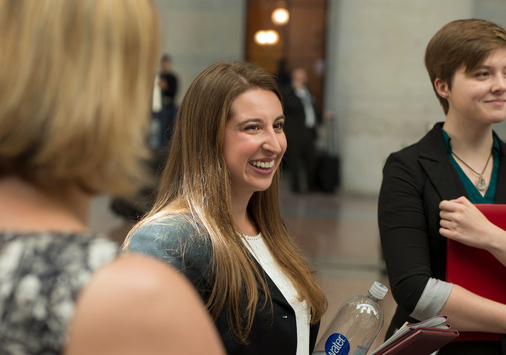The real question is not, “What is the value of the humanities?” It is, “What are the chances that the world can survive increasing globalization without the humanities?” says Karen E. Spierling an associate professor of history and director of global commerce at Denison University in an op-ed published in the Chronicle of Higher Education. The op-ed is reprinted below.
One of the many problems with the continuing debate about the role of the humanities in higher education is that humanists did not frame the debate. It has been framed, instead, by business schools, university administrators without humanities backgrounds, STEM advocates (again, without humanities backgrounds), and university financial officers using narrow definitions of how to interpret their bottom lines.
As a result, the debate has centered around a narrow definition of “useful” as meaning moneymaking. Nonhumanists and humanists alike who step up to defend the humanities buy into this distinction by defending the humanities, counterintuitively, as “not useful.” This is no way to win the argument for the humanities.
For example, last year the Harvard Business Review published an essay, “Business Does Not Need the Humanities — but Humans Do.” The argument was based on a traditional view of the humanities as subjects that contribute to the improvement of individuals — including improvement in leaders’ decision-making skills — but do not have immediate, “practical” (moneymaking) applications.
Similarly, a recent essay in America Magazine, “The Humanities May Seem Pointless, but That Is the Point,” takes on the moneymaking ultimatum by arguing for a “gradual cultural transformation where utility is not the only source of value and where the humanities can be taught and enjoyed without appealing to any extraneous advantage that can be received from it.” While the piece’s challenge to the practice of judging utility only by financial profit is crucial, neglecting to engage with other possible ways of thinking about how ideas are “useful” limits the audience and the impact of the argument.
Is self-reflection the sum of what the humanities contribute to the world or to an individual’s path in life? Not even close. Enough. It is time for humanists to go on the offensive. Not by shoring up our silos or rejecting collaboration with nonhumanists. Not by insisting that the nature of the humanities is somehow unchanging across time and place and, thus, of ineffable and universal value. And not by giving in to the pressure to reduce the goals of our teaching to producing students who can manage both spoken and written communication effectively. (This is certainly an inherent product of humanities teaching, but not an isolated goal.)
Instead, we must make clear what we ourselves already understand: There is no functioning, stable, globalized world of the future without the humanities.
A world based on the constant global exchange of information, goods, services, and money depends upon an increasing need to rapidly access another person’s or organization’s point of view, cultural assumptions, and social norms. In a world where exchanges of all kinds rely on technology and big data, some of the greatest potential pitfalls come not in the numbers but in the interpretation of those numbers, the communication strategies needed to carry out initiatives based on those numbers, and the relationship-building areas of all types of work.
Functioning effectively in a globalized society — in business, politics, medicine, education, daily interactions with immigrants in one’s own community, or daily interactions with locals in the community into which one has immigrated — requires the skill of rigorous, critical, empathetic thinking.
Not just run-of-the-mill empathy. Not a wishy-washy definition of empathy that reduces it to natural feelings or emotions. Not just instinctive “people skills.” Not some kind of imagined empathy that depends on a person’s inherent ability to listen well and think from another person’s point of view. Not touchy-feely but uninformed sympathy for “those less fortunate” in other parts of the world. Instead, navigating this globalized world requires sophisticated, well-honed skills of empathy.
Rigorous, critical, empathetic thinking. How else are we to understand the experiences and points of view of co-workers, trading partners, or colleagues who live long distances from us? There are limits to global travel, and those limits are becoming more glaring as our climate-change crisis picks up speed. There are limits to technology — even with all of its benefits — and to how we communicate through video chats and instantaneous texting. There are limits to how much time and energy we can invest in moving to another place and immersing ourselves physically in the cultural practices of another society.
In contrast, there are almost no limits to the ways that we can develop our understanding of other people, places, and societies through studies in the humanities, when that work is done well. In 2019, studying “the humanities” no longer means studying Western cultural traditions exclusively. It no longer means reading the work of a 19th-century white male European and assuming that his point of view captures the complete experience of what it means to be human.
Instead, studying the humanities is the gateway into thoughtful, critical, nuanced understanding of people, societies, and cultures far away — geographically, chronologically, socially, economically — from one’s own. Courses in history, literature, religion, languages, art history, and philosophy provide practical handbooks for how to navigate the world. What questions to ask, what themes to look for, what particular patterns of behavior or thought might reveal.
Can reading poetry and philosophy soothe your soul? Absolutely. Can studying religion and art history help you to explore notions of truth and beauty in order to understand how they shape your own life? Without question. Will examining history introduce you to individual historical actors who inspire (and horrify) you? Yes.
But is self-reflection the sum of what the humanities contribute to the world or to an individual’s path in life? Not even close.
In a 2013 essay titled “Globalization and the Humanities in the Twenty-First Century,” Alexa Alice Joubin, a professor in the English department at George Washington University, wrote, “In our age of globalization, understanding other peoples’ stories means the difference between being a window shopper and being an informed decision maker in international arenas.” This is the core of the humanities offensive: Scientific data alone does not inform and cannot explain all actions and decisions. The humanities provide vital tools for navigating our globalized world.
In a historical moment when trade wars are being justified with nationalistic and nostalgic views of history, when authoritarian politicians increasingly rely on their followers’ lack of rigorous empathetic thinking for the success of their fearmongering, and when the global economy is at risk of breaking due to historically unprecedented levels of income inequality, college administrations must go on the offensive with us and assert the critical role of the humanities in building a global future.
The real question is not, “What is the value of the humanities?” It is, “What are the chances that the world can survive increasing globalization without the humanities?”














